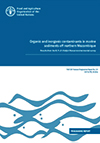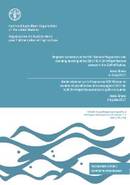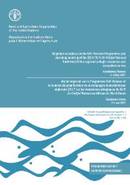EAF-Nansen Programme reports

The report presents the results of the measurements of grain size, total organic carbon (TOC), hydrocarbons and metals in surface sediments (>100 samples) collected from 40 locations off the coast of northern Mozambique during an environmental survey in March–April 2018. The survey was carried out from the R/V Dr Fridtjof Nansen in the following areas: (i) Pemba – planned gas industry logistic base, (ii) Ibo Island (Quirimbas National Protected Area) to St. Lazarus Bank – the reference area, and (iii) Palma - gas exploration area. The contents of fine-grained fraction (

The main objectives of the workshop were to introduce partners to the components and expected outputs of the new EAF-Nansen Programme, and to identify priorities for the upcoming survey and in the programme, in general, for the countries of the Gulf of Guinea. The workshop was attended by 28 participants from fishery research and management institutions of the Gulf of Guinea countries, as well as from the Norwegian Institute of Marine Research (IMR), Norway’s Directorate of Fisheries (DoF) and FAO.
Les principaux objectifs de l'atelier étaient de présenter aux partenaires les composantes et les résultats attendus du nouveau Programme EAF-Nansen, et d’identifier les priorités pour la prochaine campagne et du programme, en général, pour les pays du golfe de Guinée. L’atelier a réuni 28 participants des institutions de recherche et de gestion halieutiques des pays du golfe de Guinée, ainsi que de l’Institut norvégien de recherche marine (IMR), de la Direction norvégienne des pêches (DP) et de la FAO.

This is the report of a regional workshop organised under the EAF-Nansen Programme “Supporting the application of the Ecosystem Approach to Fisheries management considering climate and pollution impacts”. The workshop took place at the premises of the National Fisheries Research Institute (Institut National de Recherche Halieutique - INRH) in Casablanca, Morocco from 5 to 7 May 2017. The main objectives of the workshop were to determine regional priorities within the research themes of the EAF-Nansen Programme science plan, identify specific research that could be carried out collaboratively and to review objectives of the 2017 R/V Dr Fridtjof Nansen survey in Northwest Africa.
Ce document est le rapport d'un atelier régional organisé dans le cadre du Programme EAF-Nansen «Appuyer l'application de l'approche écosystémique de la gestion des pêches en tenant compte des impacts du climat et de la pollution». L'atelier s'est déroulé à l'Institut national de recherche halieutique (INRH) à Casablanca, au Maroc, du 5 au 7 mai 2017. Les principaux objectifs de l'atelier étaient de déterminer les priorités régionales au niveau des thèmes de recherche du plan scientifique du Programme EAF-Nansen, d’identifier les travaux de recherche spécifiques qui pourraient être menés en collaboration et d’examiner les objectifs de la campagne 2017 du N/R Dr Fridtjof Nansen en Afrique du Nord-Ouest.

(ENG) This strategy document was formulated to guide the EAF-Nansen Programme capacity development activities. The current phase of the Nansen Programme aims to strengthen capacity of countries and regional organizations for managing fisheries according to the ecosystem approach to fisheries (EAF) through an integrated approach, considering all three levels of interlinked capacity: enabling environment, institutional and individual.
(FR) Ce document de stratégie du Programme EAF-Nansen a été formulé pour guider les activités de développement des capacités du Programme. La phase actuelle du Programme Nansen, intitulée Programme EAF-Nansen, vise à renforcer les capacités des pays et des organisations régionales à gérer les pêches conformément à l'AEP par le biais d'une approche intégrée qui tient compte des trois niveaux de capacité interconnectée: environnement favorable, environnement institutionnel et individual.

This is a strategy document of the EAF-Nansen Programme, formulated to guide the Programme’s activities on gender equality aspect. Mainstreaming gender and striving for gender equality in fisheries will support the EAF-Nansen Programme in achieving its intended impact: “sustainable fisheries improve food and nutrition security for people in partner countries.” Thus, much like FAO, the EAF-Nansen Programme promotes gender equality in all its areas of work.
